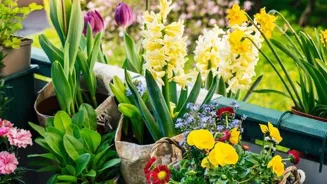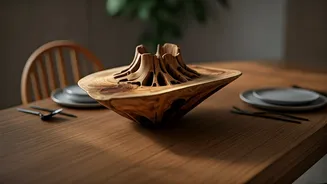Transform your backyard into a blooming oasis with 10 easy gardening hacks! Learn tips for a thriving garden in India
Namaste, garden lovers! Are you dreaming of a lush, green garden overflowing with colourful
flowers and healthy veggies? But perhaps you think you don't have a "green thumb"? Fret not! Gardening doesn't have to be complicated or expensive.
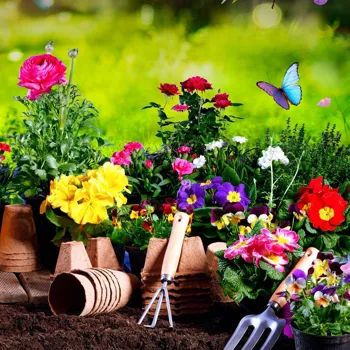
With a few clever tricks and a little bit of effort, you can transform your backyard (or even your balcony!) into a thriving oasis. We've compiled ten easy gardening hacks that are sure to give your plants a boost and bring out the best in them.
So, grab your gardening gloves, and let's get started! These tips are designed for the Indian climate and are perfect for both beginners and experienced gardeners alike. Get ready to watch your plants flourish with these simple secrets!
Coffee grounds make excellent natural fertilizer for plants
Are you tired of spending money on expensive fertilizers? Coffee grounds are your answer! After you enjoy your morning cuppa, don't throw away those grounds. They're a fantastic natural fertilizer, especially for acid-loving plants like roses, tomatoes, and azaleas.
Coffee grounds are rich in nitrogen, which is essential for healthy growth. Simply sprinkle the used coffee grounds around the base of your plants and gently mix them into the soil. Over time, the grounds will break down and release nutrients, giving your plants a much-needed boost.
Remember not to use too much, as excessive acidity can be harmful. Another cost-effective fertilizer alternative is to use your own kitchen scraps. Vegetable peels, fruit rinds, and eggshells can all be composted and added to your garden soil.
These scraps are packed with essential nutrients that will nourish your plants and improve soil quality. Start a compost bin in your backyard to easily collect and decompose your kitchen waste. It's an eco-friendly way to recycle and create nutrient-rich soil for your garden.
Effective plant watering: avoid overwatering, use finger test, ensure drainage, collect rainwater, deep watering
Watering your plants effectively is critical for their survival, especially during the hot Indian summers. But overwatering can be just as harmful as underwatering. A simple test to check if your plants need water is the "finger test." Stick your finger about an inch or two into the soil.
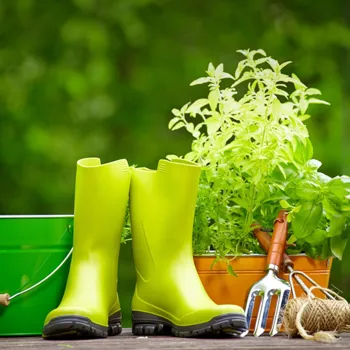
If the soil feels dry to the touch, it's time to water. If it still feels moist, hold off on watering for another day or two. Many folks tend to drown their indoor plants. To ensure proper drainage, place a layer of gravel or pebbles at the bottom of your pots.
This will prevent the roots from sitting in water and rotting. You can also use terracotta pots, which are porous and allow excess moisture to escape. For an eco-friendly watering solution, collect rainwater in a bucket or container.
Rainwater is naturally soft and free of chemicals, making it ideal for your plants. Watering deeply but less frequently is always better than watering lightly every day. Deep watering encourages the roots to grow deeper, making the plants more resilient to drought.
Natural pest control methods for a healthy garden ecosystem
Pests can quickly destroy your garden if left unchecked. Instead of using harsh chemical pesticides, try natural pest control methods. Neem oil is a fantastic natural insecticide that can effectively combat a wide range of pests, including aphids, mealybugs, and spider mites.
Dilute neem oil with water according to the instructions on the bottle and spray it on your plants. Another natural pest repellent is to plant companion plants like marigolds and basil. Marigolds deter nematodes and other soil pests, while basil repels flies and mosquitoes.
Creating a healthy garden ecosystem can also help control pests naturally. Encourage beneficial insects like ladybugs and lacewings to visit your garden by planting flowers that attract them. Ladybugs, for example, are voracious eaters of aphids.
Keep a close eye on your plants and address any pest problems early on before they escalate. Identifying and removing pests manually can prevent them from spreading to other plants.
Plants need right light: balance for growth, avoid scorching
Sunlight is essential for plant growth, but too much direct sunlight can scorch delicate leaves, especially in the Indian climate. Pay attention to the light requirements of your plants and provide them with the appropriate amount of shade.
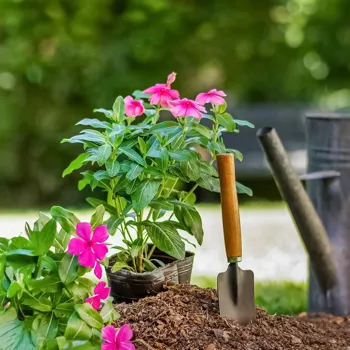
If you have plants that prefer partial shade, place them near a tree or use a shade cloth to filter the sunlight. Windowsills that face east or west usually provide ideal lighting for indoor plants.
However, during the hottest part of the day, you may need to move your plants away from the window to prevent them from getting burnt. Observe how your plants are responding to the light and adjust their placement accordingly.
If the leaves are turning yellow or brown, it could be a sign of too much sunlight so adjust them accordingly. If your plants are getting leggy and reaching for the light, they may not be getting enough sunlight.
Recycle eggshells for plants; use cinnamon as fungicide; repurpose tea bags for tannins
A simple way to recycle and benefit your plants is to use eggshells as a natural booster. Eggshells are mainly calcium carbonate, a key element for robust plant cell growth and blossom end rot prevention in tomatoes and peppers.
Simply crush eggshells finely and mix them into the compost or directly into the soil where plants are planted. Additionally, eggshells prevent snails and slugs that damage plants.
Furthermore, cinnamon is not just for flavoring your chai, It is an excellent fungicide that would avoid fungal infections in seedlings and plants. Sprinkle some cinnamon around the roots of your little plants to combat damping off disease. Another simple hack is to repurpose old tea bags.
These are great for adding tannins to the soil particularly enjoyed by your Roses.
Ten easy gardening hacks for flourishing plants. Happy gardening!
So there you have it – ten easy gardening hacks to help your plants flourish! Gardening is a continuous process. Experiment with these tips, learn from your experiences, and watch your garden bloom beautifully.
With a little bit of love, care, and these simple tricks, anyone can achieve a thriving garden. Happy gardening! Remember to observe your plants regularly, adapt these hacks to your particular needs, and most importantly, enjoy the process of nurturing your green friends.
Your garden is a reflection of your care, and with these tips, it's bound to thrive!
AI Generated Content. Glance/InMobi shall have no liability for the content